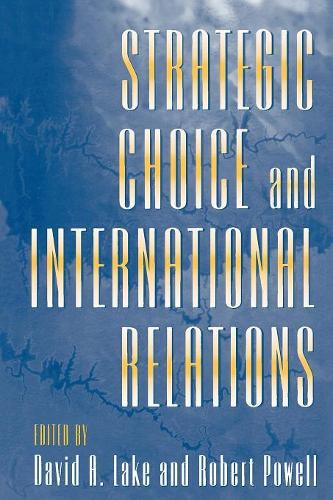
Strategic Choice and International Relations
(Paperback)
Publishing Details
Strategic Choice and International Relations
By (Author) David A. Lake
Edited by Robert Powell
Princeton University Press
Princeton University Press
19th October 1999
United States
Classifications
Professional and Scholarly
Non Fiction
Political science and theory
327.101
Physical Properties
Paperback
280
Width 197mm, Height 254mm
397g
Description
The strategic-choice approach has a long pedigree in international relations. In an area often rent by competing methodologies, editors David A. Lake and Robert Powell take the best of accepted and contested knowledge among many theories. With the contributors to this volume, they offer a unifying perspective, which begins with a simple insight: students of international relations want to explain the choices actors make--whether these actors be states, parties, ethnic groups, companies, leaders, or individuals. This synthesis offers three new benefits: first, the strategic interaction of actors is the unit of analysis, rather than particular states or policies; second, these interactions are now usefully organized into analytic schemes, on which conceptual experiments may be based; and third, a set of methodological "bets" is then made about the most productive ways to analyze the interactions.Together, these elements allow the pragmatic application of theories that may apply to a myriad of particular cases, such as individuals protesting environmental degradation, governments seeking to control nuclear weapons, or the United Nations attempting to mobilize member states for international peacekeeping. Besides the editors, the six contributors to this book, all distinguished scholars of international relations, are Jeffry A. Frieden, James D. Morrow, Ronald Rogowski, Peter Gourevitch, Miles Kahler, and Arthur A. Stein. Their work is an invaluable introduction for scholars and students of international relations, economists, and government decision-makers.
Reviews
"Elegant and groundbreaking ... a useful and insightful framework to guide debates over American foreign policy."--Foreign Affairs "Highly recommended for international relations theorists and policy practitioners."--Choice "Lake skillfully investigates an important dimension of international behavior unduly neglected by traditional theory, and his analysis of the early Cold War is particularly insightful. This is, on balance, an innovative and challenging work that deepens our understanding of American internationalism in the twentieth century."--Frank Ninkovich, American Historical Review
Author Bio
David A. Lake is Research Director for International Relations at the Institute on Global Conflict and Cooperation, and Professor of Political Science at the University of California, San Diego. He is the author of Entangling Relations (Princeton). Robert Powell is Robson Professor of Political Science at the University of California, Berkeley. He has written widely on the application of game theory to issues in strategic studies and international relations theory. He is the author of Nuclear DeterrenceTheory: The Search for Credibility and In the Shadow of Power.
